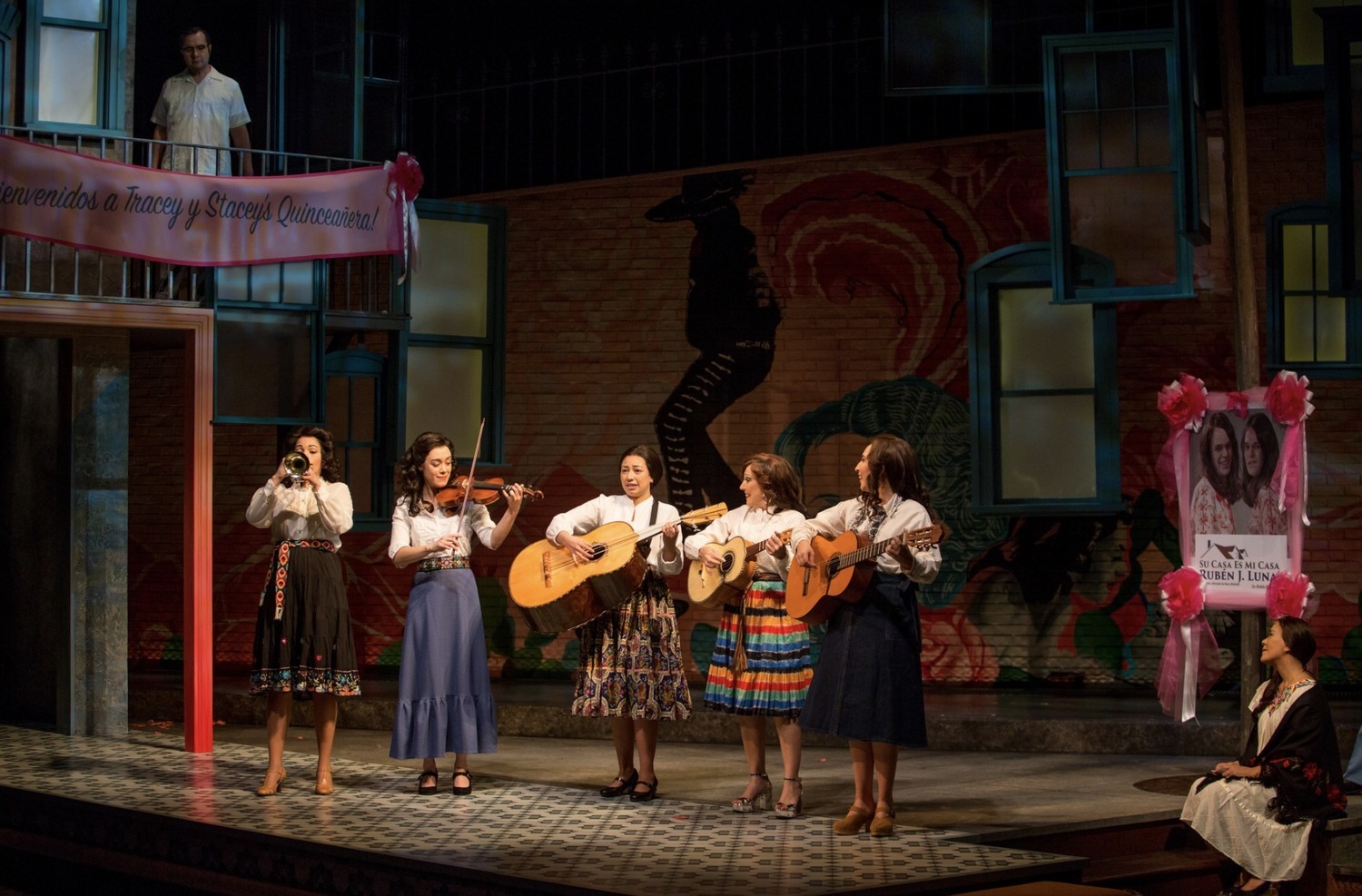Review Roundup: AMERICAN MARIACHI at Denver Center For The Performing Arts

Denver Center for the Performing Arts presents the World Premiere of AMERICAN MARIACHI, written by José Cruz González. AMERICAN MARIACHI tells the story of a group of young women in the 1970s who break tradition to form an all-female Mariachi band. AMERICAN MARIACHI opened on January 26th and will run through February 25th.
The Cast of AMERICAN MARIACHI: Natalie Camunas (Gabby/Ensemble), Crissy Guerrero (Soyla/Sister Manuela/Ensemble), Rodney Lizcano (Mino/Padre Flores/Ensemble), Doreen Montalvo (Amalia/Doña Lola/Ensemble), Jennifer Paredes (Lucha/Ensemble), Bobby Plasencia (Federico/Ensemble), Luis Quintero (Mateo/René/Rubin/Ensemble), Amanda Robles (Isabel/Tía Carmen/Ensemble), and Heather Velazquez (Hortensia (Boli)/Ensemble).
The Creative Team: José Cruz González (Playwright), James Vásquez (Director), Cynthia Reifler Flores (Music Director), Regina Garcia (Scenic Designer), Meghan Anderson Doyle (Costume Designer), Paul Miller (Lighting Designer), Ken Travis (Sound Designer), Shirley Fishman (Dramaturg), Rachel Ducat (Stage Manager), and Heidi Echtenkamp and Amanda Salmons (Assistant Stage Managers).
The Band: Martin Padilla (Violin), Tomás Tinoco Jr. (Violin), Trumpet: Guadalupe Zarate (Trumpet), Erick Jiménez (Vihuela), and Ruben Marin (Guitarrón).
Let's see what the critics had to say!
Joanne Ostrow, The Know: Excavating layers of feeling on the themes of love, memory and trust, the story is at once personal and universal: a Chicano family, a mother with Alzheimer's disease. While some of the dialog is in Spanish, the meaning is usually clear enough from context for non-Spanish-speakers. (A few laughs were lost, but what's lost in literal words is gained in authenticity.) While delving into Latino culture, in a specific time and place, (mid-'70s, the western United States), the story asks what was then a boldly feminist question: Why can't a girl be in a mariachi band? Outrageous!, the traditionalists scoff. Lucha (Jennifer Paredes) is launched on her journey to learn about mariachi because it seems to be the one way to connect with her mother through the fog of dementia. Amalia (Doreen Montalvo) is stirred by a certain ballad that momentarily brings her back to reality or takes her back to happier times. Lucha and her cousin/best friend Boli (Heather Velazquez in a hilarious turn) decide to pursue an all-girl mariachi troupe, and set about collecting band members. Never mind that none can play an instrument ... they're determined. Crissy Guerrero plays sexpot hairstylist Soyla, Natalie Camunas plays painfully shy Gabby, Amanda Robles is the unfulfilled Isabel, shuttered by an overbearing husband. Bobby Plasencia as Amalia's rigid husband Federico and Rodney Lizcano as the caring instrument-maker Mino are distinctive, sympathetic types. They are former friends with a complicated history. Luis Quintero wins laughs in multiple roles, both slick and slimy, macho and fey. Paredes manages to evolve in front of our eyes, creating in daughter Lucha a stirring and strong character.
Greg Moody, CBS 4: It's a show about music and memory, tradition, culture and somehow reaching into the past to unlock the memories that are drifting away. "American Mariachi" by Jose Cruz Gonzalez has been developed and nurtured by the Denver Center Theatre Company, and it's easy to see why. It's that rare show that brings tears and laughter, while using musical tradition to deal with modern issues. Lucha is a young woman determined to relight her mother's memory through mariachi, and in doing so, takes the audience on a journey of discovery: her own, her friends, her family, and one of the music itself. While both tender and funny, the show races along almost too quickly, painting both characters and situations with very board strokes. I wanted more to savor, but in the end I truly did enjoy "American Mariachi."
Tony Garcia, Latin Life Denver: Although the play is set in the U.S., the location is never a factor in the story. The characters speak Spanish and English, work, love their families and have dreams. They do not talk about their immigrant experience, nor their border crossing. They also do not talk about gang life, prison sentences nor drug use. We find the characters are normal. That is one of the greatest beauties of American Mariachi, the profound yet simple truth that we are normal, in our contemporary political environment there is tremendous power in that concept. The playwright also makes no accommodation for a monocultural audience, interweaving Spanish and English, often without translation. Some of the biggest punchline are in Spanish only. We are also not given a European-American to serve as our guide through this very Mexican journey. There are no translators or sympathetic allies waiting to sweep in and save us. The play is offered from a very, " entre nosotros" perspective. This is our family complete with joy and pain, you are invited in to view and share. We understand we are not perfect, can you? ...The core of American Mariachi is the heart. It is about family, and intense love, and like any good bolero it carries with it that aching moment of hubris that will not only harm, but scar for years into the future. As it is our humanness and the accompanying weakness that creates the tragedy, it is also that diametrical opposite human trait, it is our ability to forgive and reconcile that will heal us.
Photo Courtesy of Denver Center for the Performing Arts.
Reader Reviews

Videos

